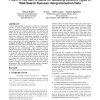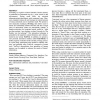31 search results - page 2 / 7 » Guilt by association as a search principle |
SIGIR
2011
ACM
2011
ACM
Find it if you can: a game for modeling different types of web search success using interaction data
12 years 8 months ago
A better understanding of strategies and behavior of successful searchers is crucial for improving the experience of all searchers. However, research of search behavior has been s...
CHI
2011
ACM
12 years 9 months ago
2011
ACM
According to cognitive science literature, human memory is predicated on contextual cues (e.g., room, music) in the environment. During recall tasks, we associate information/acti...
IMC
2010
ACM
13 years 3 months ago
2010
ACM
Online advertising supports many Internet services, such as search, email, and social networks. At the same time, there are widespread concerns about the privacy loss associated w...
SAC
2010
ACM
13 years 10 months ago
2010
ACM
Developed using the principles of the Model-View-Controller architectural pattern, FolksEngine is a parametric search engine for folksonomies that allows us to test arbitrary sear...
PAAMS
2010
Springer
13 years 10 months ago
2010
Springer
In this paper, we introduce a new heuristic search algorithm based on mean values for anytime planning, called MHSP. It consists in associating the principles of UCT, a bandit-base...


